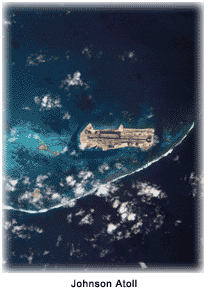Various land masses in the Pacific Ocean were the sites of large accumulations of guano (dried bird droppings). Those deposits were noted by the officers and crews of numerous ships making voyages in the early 19th century and were regarded as important discoveries because of the demand for guano as fertilizer. Congressional protection was afforded to the discoverers through the Guano Act of 1856, providing:
Whenever any citizen of the United States discovers a deposit of guano on any island, rock, or key, not within the lawful jurisdiction of any other Government, and not occupied by the citizens of any other Government, and takes peaceable possession thereof, and occupies the same, such island, rock, or key may, at the discretion of the President, be considered as appertaining to the United States.
 Such unincorporated territories as Baker, Jarvis and Howland islands, and Kingman Reef and Johnston Atoll were protected under the provisions of this measure.
Such unincorporated territories as Baker, Jarvis and Howland islands, and Kingman Reef and Johnston Atoll were protected under the provisions of this measure.